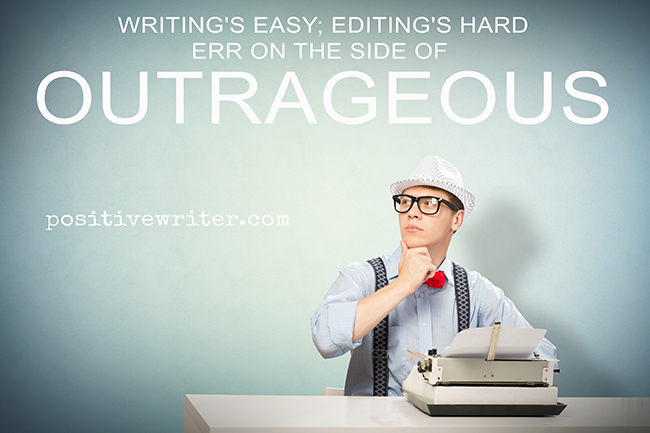Writing’s easy; editing’s hard. Getting lost in the fun and the discovery of putting down words can make up for the times when the words don’t come easily. But it’s during the editing process that you’re forced to look at the flaws in your creation.
How could that possibly be any fun?

Here are a few ways you can inject a little fun into the drudgery of the editing process.
6. Err on the Side of Outrageous
Easy metaphors, comfortable sentence structures and familiar details are solid and predictable, but now that your first draft is finished, you’ve got to weed out the unnecessarily ordinary.(Any “rushing river” or “windswept beach” similes sneak in? Take ’em out) Consider some more outrageous and outlandish—and ultimately, more memorable—constructs.
Need inspiration? My go-to when I want to get in the mood to take some risks is actually an English undergrad staple: T.S. Eliot’s “The Love Song of J. Alfred Prufrock.” This poem is unusually expressive, almost to a fault. Take these lines:
Let us go then, you and I,
When the evening is spread out against the sky
Like a patient etherized upon a table;
Can you go bolder than comparing an evening sky to someone who’s been anesthetized on a hospital gurney?
5. Try Some Ridiculous Constraints for Fresh Perspective
“Lipogram” is just a fancy name for the games writers play when they’re on the editing track and running out of steam. One of the most famous is the novel Gatsby, penned by Ernest Vincent Wright and written entirely without using the letter “e.”
Another editing technique, called E-Prime, involves eliminating all forms of the verb “to be” from your writing. No ams, is-es, was-es, weres, bes, beings, and beens, no passive voice, no unclear connections between subjects and objects.
Consider adopting one of these constraints or just make one up! It can be exasperating, but also fun.
4. Remember Blaise Pascal’s Words.
One of the reasons editing can be difficult is the sheer amount of time it takes, sometimes even longer than writing the first draft. And that’s okay! If your time commitment to editing is getting you down, remember this humorous quote, attributed to 17th-century mathematician, physicist and philosopher Blaise Pascal:
I have only made this letter longer because I have not had the time to make it shorter.
3. Engage Your Secret Weapon.
Every writer needs a weapon in his or her arsenal to help thaw the creative flow, which tends to get frozen during editing. Do you have a favorite piece of writing you’ve done recently? Something that, when you re-read it, gives you an extra boost of confidence in your chosen profession? Make that your secret weapon during the editing process!
When you hit a rough patch, pull out your favorite piece of writing and re-read it as a small reminder of what you’re capable of (and keep editing).
2. Sleep. A lot.
This probably sounds patronizingly simple, but it’s really easy to think, “Just one more page,” and sacrifice sleep to push through the daunting pile of manuscript pages. Whenever I do this, I wind up in an awful mood that tends to stick around until I’ve had a nap. Like a giant, caffeine-addled toddler.
Be mindful of a regular sleep schedule, and consider using a sleep tracker app to help you monitor your quality and quantity of shut-eye.
1. Simply refuse to worry.
The worst part about editing isn’t the heavy mental lifting, or even the sheer amount of time it requires. Instead, it’s the worry that you’re about to discover that the draft you’re working on simply won’t work. You’re searching for your writing’s fatal flaw.
Stress can make editing seem daunting and even a little scary, but remember that, without exception, those types of fears are totally unfounded. Even novels with fatal flaws can be resurrected during editing, and if you encounter incoherence, you can always delete the offending section and try again. No worries!
What strategies do you use for getting through the editing process? Share in the comments.
